The AMD Ryzen 5 1600X vs Core i5 Review: Twelve Threads vs Four at $250
by Ian Cutress on April 11, 2017 9:00 AM ESTBenchmarking Performance: CPU Web Tests
One of the issues when running web-based tests is the nature of modern browsers to automatically install updates. This means any sustained period of benchmarking will invariably fall foul of the 'it's updated beyond the state of comparison' rule, especially when browsers will update if you give them half a second to think about it. Despite this, we were able to find a series of commands to create an un-updatable version of Chrome 56 for our 2017 test suite. While this means we might not be on the bleeding edge of the latest browser, it makes the scores between CPUs comparable.
SunSpider 1.0.2 [link]
The oldest web-based benchmark in this portion of our test is SunSpider. This is a very basic javascript algorithm tool, and ends up being more a measure of IPC and latency than anything else, with most high performance CPUs scoring around about the same. The basic test is looped 10 times and the average taken. We run the basic test 4 times.
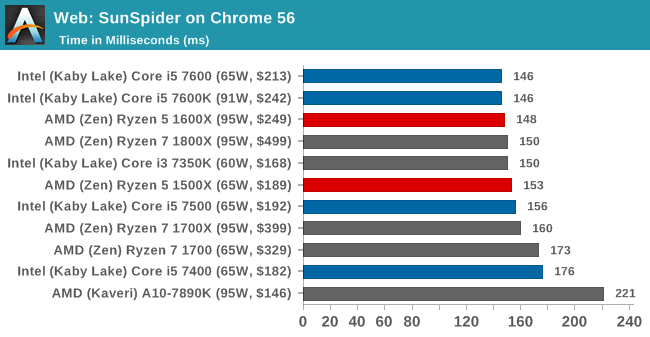
Mozilla Kraken 1.1 [link]
Kraken is another Javascript based benchmark, using the same test harness as SunSpider, but focusing on more stringent real-world use cases and libraries, such as audio processing and image filters. Again, the basic test is looped ten times, and we run the basic test four times.
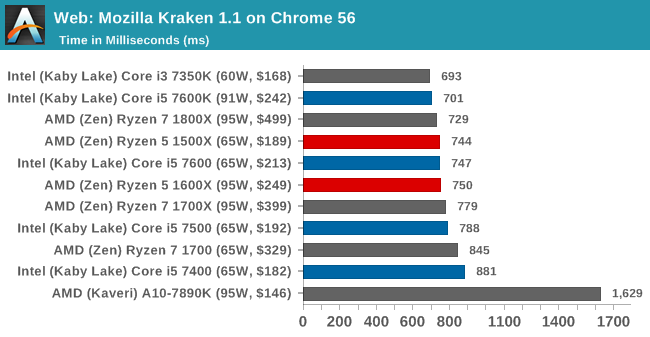
Google Octane 2.0 [link]
Along with Mozilla, as Google is a major browser developer, having peak JS performance is typically a critical asset when comparing against the other OS developers. In the same way that SunSpider is a very early JS benchmark, and Kraken is a bit newer, Octane aims to be more relevant to real workloads, especially in power constrained devices such as smartphones and tablets.
WebXPRT 2013 and 2015 [link]
While the previous three benchmarks do calculations in the background and represent a score, WebXPRT is designed to be a better interpretation of visual workloads that a professional user might have, such as browser based applications, graphing, image editing, sort/analysis, scientific analysis and financial tools. Web2013 is the older tool, superceded by Web2015, however both still are highly relevant for high-performance web applications today.
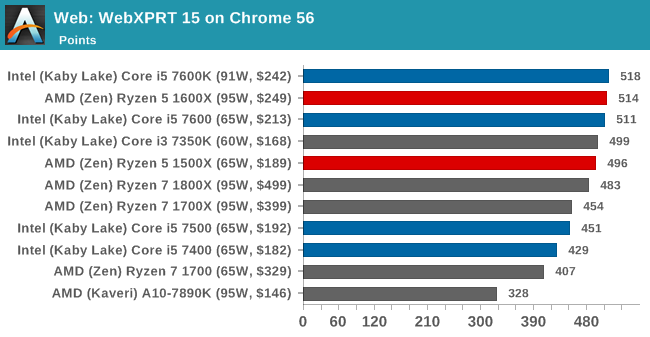


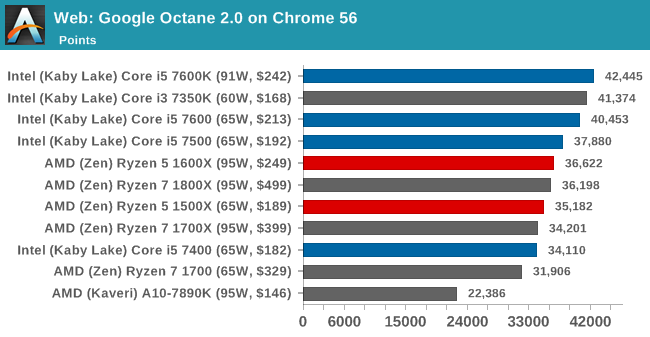
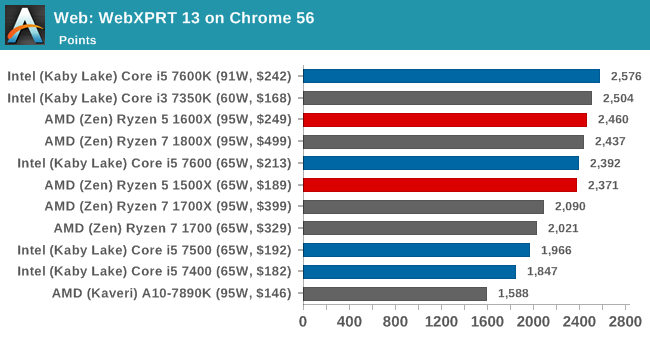








254 Comments
View All Comments
mmegibb - Tuesday, April 11, 2017 - link
Where did you get your info about OC'ing the 1600? I haven't seen much about OC'ing the Ryzen chips, at least in these initial comprehensive reviews. (I haven't searched much either). I still haven't decided between the 7600k and the 1600x, and how the 1600x overclocks will be a factor.haukionkannel - Tuesday, April 11, 2017 - link
All Ryzens in all test have been running between 3.9-4.1 in all owerclocking test. So it does not matter what Ryzen you get. The oc performance is the same. Must be because if the manufacturing proses. This could be a beast if made by intel factories ;)MrSpadge - Tuesday, April 11, 2017 - link
No, such a hard an consistent speed limit is usually by chip design. If it was "just the silicon lottery" there'd be more spread, like you see with Intels.Outlander_04 - Tuesday, April 11, 2017 - link
https://www.youtube.com/watch?v=3VvwWTQKCZsi5 and Ryzen 5 at good OC's
cheshirster - Wednesday, April 12, 2017 - link
People are already bying 1600, it runs 3.8 OC on a box cooler1600X has no room to overclock at all
cheshirster - Wednesday, April 12, 2017 - link
+1600bobbozzo - Tuesday, April 11, 2017 - link
Hi Ian, on the last page,Rise of the Tomb Raider’s benchmark is notorious for having each of its three _seconds_ perform differently
I think that should be 'scenes' not seconds.
Thanks!
mmegibb - Tuesday, April 11, 2017 - link
In the gaming benchmarks, Intel generally has higher average framerates. But, interestingly, in the 99th percentile and time-spent-under-60fps, Ryzen usually tops Intel. To me, this translates into an overall smoother and more consistent game play experience with the Ryzens. Is that right?I've been on Intel processors for years. In fact, my son still is doing heavy-duty 1080P gaming with an OC'd i5-2500k. But, soon I'm going to replace that beloved CPU, and I want to buy a Ryzen just to upset the apple cart and do something different.
I've been disappointed in the Ryzen 7 reviews as far as gaming is concerned. But, this review gives me hope. I'm really thinking that triple the threads of the i5-7600k with only a small loss of gaming performance is the way to go. Especially with DX12 getting more common.
Achaios - Tuesday, April 11, 2017 - link
Αs a gamer, what you are primarily interested in is Single Threaded Performance simply because there's a host of games out there that depend on Single Threaded performance:1. All World of Warcraft versions.
2. All Total War versions.
3. Starcraft II.
4. Civilization games.
...and so on. The OP is just giving you a review tailored to make Ryzen shine whereas in fact it still is an inferior CPU for gaming due to inferior Single Threaded performance.
Very few games use for than 2-4 Cores, so that makes Ryzen largely irrelevant at the moment. It will also be irrelevant in the future too when games will begin utilizing more than 4 cores, because there will be -by then- far better Intel & AMD processors.
mmegibb - Tuesday, April 11, 2017 - link
Yes, forever gaming reviews have hammered the idea that all that matters is single threaded performance.However, as I mentioned, this review shows the 1600x beating the 7600 in 99th percentile and time under 60fps, even in games like GTA V. Those are very important benchmarks for gaming quality perception. You didn't talk to that at all. You just repeated the boilerplate about "single core" that we all know.
Also, I don't think it will be too far in the future when more games use DX12, and that seems to make a big difference.
I think I'm getting a whiff of "intel-fanboy" from your post.